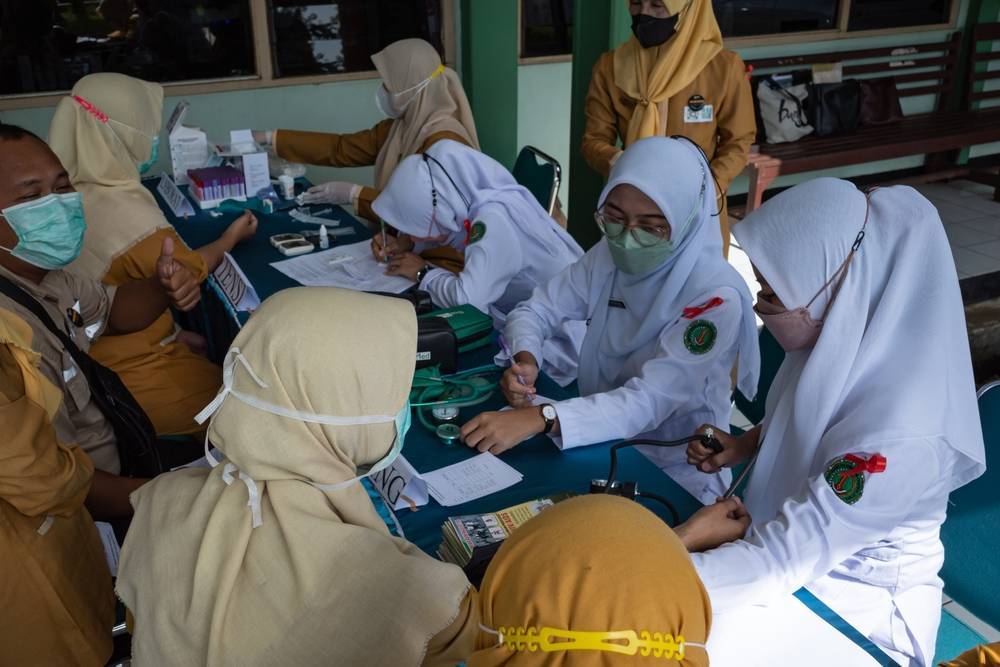Indonesia is grappling with a significant public health crisis, with a higher-than-average number of housewives and pregnant women contracting sexually transmitted diseases (STDs), including HIV and syphilis, according to recent data from the Health Ministry.
This rise in STDs is attributed to a lack of sexual health awareness and risky sexual behaviours by their partners.
An Unsettling Trend
Based on data from the Health Ministry, approximately 35% of all new HIV cases in Indonesia are found in housewives, outpacing other vulnerable demographics such as the partners of sex workers or men who have sex with men. Each year, about 5,100 housewives in the country contract HIV, with around 33% being infected by their husbands.
Additionally, syphilis cases have spiked by an alarming 70% in the past five years, increasing from roughly 12,000 incidents in 2016 to 21,000 in recent years. Each year, among the 17,000-20,000 new syphilis patients, around 5,500 are pregnant women.
Muhammad Syahril, the spokesperson for the Health Ministry, stated that the primary reasons for the high STD transmissions among housewives and pregnant women are the lack of knowledge about STDs and prevention methods, and their partners engaging in high-risk sexual behaviour.
Infants at Risk
The high incidence of pregnant women contracting HIV and syphilis puts thousands of infants in danger. Pregnant women with HIV have a 20-45% chance of transmitting the virus to their babies at birth and during breastfeeding. In contrast, those with syphilis face a 60-80% risk of transmitting the disease to their babies. If left untreated, syphilis in pregnant women can lead to miscarriage, stillbirth, or neonatal death.
Intervention Measures
Since 2017, health authorities have been providing free HIV, syphilis, and hepatitis B tests for pregnant women. Siti Nadia Tarmizi, another spokesperson for the ministry, stated that health workers always offer these tests to pregnant women and provide free treatment for positive results to prevent transmission to infants.
Despite the widespread availability of free STD tests and treatment, the uptake remains low due to societal stigma and shame. Out of approximately 5 million pregnancies per year, only 55% of expectant mothers are willing to undergo HIV tests. Additionally, a mere 25% agree to syphilis tests, often due to a lack of consent from their husbands.
The Role of Gender Inequality
According to Ayu Oktariani from the Indonesian Positive Women Network (IPPI), gender inequality is a significant barrier to preventing and treating STDs in women. She points out that despite working to combat HIV for over four decades, the government has only recognized women as a vulnerable group in the last five years.
Oktariani also highlighted that health authorities have failed to consider how gender-based violence escalates women’s risks of HIV infection. Women living with HIV don’t only need treatment access for their well-being. Social norms and patriarchal settings also affect them, increasing their risk of gender-based violence. This, in turn, can create barriers to accessing medical treatment, negatively affecting their overall quality of life.
The Way Forward: A Holistic and Comprehensive Approach
Addressing this crisis requires a holistic and comprehensive approach. It should target to reduce and prevent HIV transmission in women and ensure their access to treatment. We must tackle this problem as a social issue, not just a health issue. It demands a united effort from several ministries. They should educate the public on STDs and women’s reproductive health rights. This collaborative effort would also help fight the stigma against women living with HIV-AIDS, enabling them to seek treatment without fear of societal backlash.
With concerted efforts, Indonesia can tackle this public health crisis head-on, ensuring the well-being of women and children, and reducing the prevalence of sexually transmitted diseases in the country.

